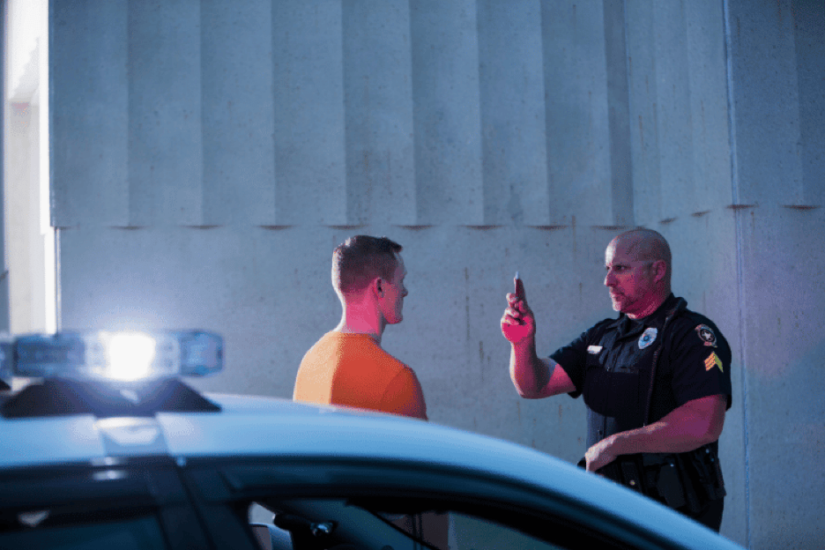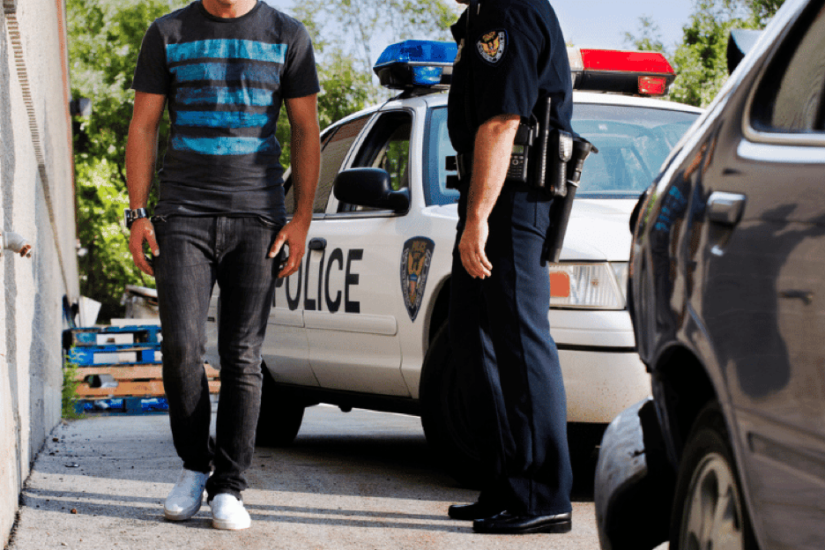September 11, 2023

Field sobriety tests play a crucial role in identifying and apprehending individuals who may be driving under the influence of alcohol or drugs.
The tests consist of a series of physical and cognitive assessments that require balance, coordination, and attention—skills that are often compromised when intoxicated.
This article delves into the various field sobriety tests in Texas, including their procedures, limitations, and more.
Types of Field Sobriety Tests in Texas
In Texas, field sobriety tests consist of the one-leg-stand test, the walk-and-turn test, and the horizontal-gaze-nystagmus (HGN) test.
These tests evaluate different aspects of a person’s physical and cognitive abilities, helping police officers determine whether a person is driving under the influence of alcohol or drugs. They’re often used in combination to ensure maximum accuracy for the arrest.
One Leg Stand Test
The one-leg-stand test assesses a person’s balance and attention.
In this test, the individual in question is instructed to stand on one leg while raising the other about six inches off the ground. While in this position, they’re asked to count out loud for 30 seconds.
Law enforcement officers observe for signs of swaying, hopping, using arms for balance, or the inability to sustain the raised position.
The one-leg-stand test has an accuracy level of only 65%, according to the US Department of Justice.
Individuals who aren’t under the influence may still fail the test for various reasons, including health conditions, physical limitations, and even nervousness to maintain balance and perform the task as instructed.
The road’s condition may also affect the test’s accuracy. Factors such as weather conditions, poor lighting, uneven terrain, and distractions from passing traffic might hinder a person’s performance on the test.
Walk And Turn Test

The walk-and-turn test focuses on a person’s ability to maintain balance, follow instructions, and perform coordinated movements.
During this test, the person in question takes nine heel-to-toe steps along an imaginary straight line, turns, and returns with another nine steps. While doing so, they’re instructed to keep their arms at their sides and count the steps out loud.
The walk-and-turn test determines two things: how well a driver follows instructions and how well they perform in the test.
Police officers pay close attention to any deviations from the instructions, as well as loss of balance, raising arms more than six inches to regain balance, and whether the person walks off the designated line.
The walk-and-turn test has an accuracy level of 68%. Much of the challenges associated with this test are similar to the one-leg-stand test. Internal and external factors, such as uneven terrain and inadequate lighting, can affect the subject’s performance on both tests.
Horizontal Gaze Nystagmus (HNG) Test

The horizontal gaze nystagmus test gauges the involuntary jerking of the eyes, which often becomes more pronounced when a person is under the influence.
In this test, the subject is asked to follow a stimulus—usually a pen or flashlight—that the officer moves horizontally.
The officer checks for three indicators of impairment:
- Lack of smooth pursuit (jerky eye movements)
- Distinct nystagmus at maximum deviation (heightened jerking when the eyes move far to the side)
- The onset of nystagmus before the eyes reach a 45-degree angle
The HNG test has an accuracy rate of 77%. Unlike the one-leg stand and the walk-and-turn, which rely on balance and coordination, the HGH test is less susceptible to external factors. It instead relies on a person’s physiological response to stimuli.
Even so, the HNG test isn’t without its limitations.
Nystagmus is a relatively common condition, affecting 1 in 1,000 people. Certain medical conditions unrelated to intoxication, like optic nerve disorders, Meniere’s disease, and strabismus (crossed eyes), can lead to nystagmus, potentially resulting in false positives.
What Happens When You Fail a Field Sobriety Test in Texas?
If you fail a field sobriety test, you’ll be asked to take a chemical test, such as a breathalyzer or blood test, to measure your blood alcohol concentration levels.
Texas has implied consent laws, meaning that by driving on Texas roads, you’ve implicitly agreed to undergo chemical testing if arrested for driving while intoxicated (DWI).
If convicted, you could face penalties such as fines, license suspension, mandatory DUI education courses, probation, or even jail time.
The stringency of the penalty depends on factors like previous offenses, blood alcohol level (BAC), and any aggravating circumstance (having a child passenger in the vehicle, accident resulting in injury or death, resisting arrest, etc.).
Can You Legally Refuse a Field Sobriety Test in Texas?

In Texas, you have the right to legally refuse a field of sobriety test. It doesn’t break implied consent laws in the same way that refusing a breathalyzer test does. That said, refusing a field sobriety test can lead to several consequences.
If you refuse a field sobriety test, the officer may ask you to perform a blood alcohol concentration test, which can be harder to argue against in court.
You can also refuse a breathalyzer or a blood test, but doing so can lead to administrative penalties like the suspension of the driver’s license for six months or longer, as per the Texas Transportation Code § 724.015.
The court may also use your refusal to suggest consciousness of guilt or impairment, fueling speculation and potentially impacting your defense strategy.
When faced with the decision to refuse a field sobriety test, it’s important to weigh the potential consequences, consider your legal rights, and consult with a legal professional who specializes in DUI/DWI cases.
Wrapping Up
Field sobriety tests are far from accurate. Various factors, such as medication conditions, environmental circumstances, and misinterpretation, can affect a person’s performance on the tests.
If you or someone you know has been wrongly assessed or arrested based on field sobriety tests, seek legal counsel from an experienced attorney today.